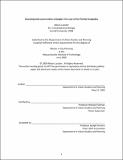Assessing land conservation strategies : the case of the Florida Everglades
Author(s)
Lassiter, Allison (Allison Blythe)
DownloadFull printable version (5.049Mb)
Other Contributors
Massachusetts Institute of Technology. Dept. of Urban Studies and Planning.
Advisor
Michael Flaxman.
Terms of use
Metadata
Show full item recordAbstract
South Florida's Everglades is home to 67 threatened and endangered species. By 2100 it is estimated that sea level rise will inundate over 20% of existing conservation lands. Species will be dislocated and migrate to new land. Simultaneously, more than 500,000 people are moving to the region annually. The new populations are subdividing and developing rural lands. By 2100, it is estimated that over 60% of rural land will be urbanized. In this thesis, I use Geographic Information Systems to project the location of urban land, conservation land and inundated land in South Florida over the next 50 years. I assess fee simple purchase and conservation easements as potential methods of conveying land protection. I conclude that none of the current methods of conservation have the capacity to manage the large scale land protection that will be critical in the coming years, if we are to protect our species from the emergent and significant stressors of climate change and urbanization. I conclude that a major federal initiative based on purchasing deed restrictions and a new agency that specializes in monitoring will be necessary to quickly creating a large, adaptive ecological reserve network.
Description
Thesis (M.C.P.)--Massachusetts Institute of Technology, Dept. of Urban Studies and Planning, 2009. This electronic version was submitted by the student author. The certified thesis is available in the Institute Archives and Special Collections. Includes bibliographical references (leaves 66-70).
Date issued
2009Department
Massachusetts Institute of Technology. Department of Urban Studies and PlanningPublisher
Massachusetts Institute of Technology
Keywords
Urban Studies and Planning.